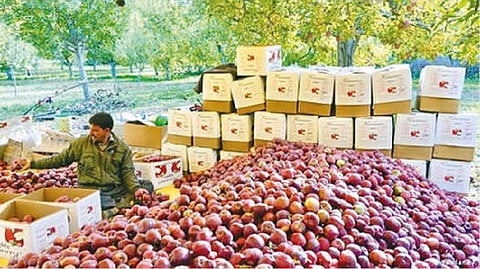

CHENNAI: Sharp temperature variations across India-administered Kashmir have brought unseasonal snowfalls or early summers, resulting in heavy damage to apple orchards. An almost 30% decline in apple production has dealt a serious blow to the region’s biggest industry, leaving farming families with huge debts.
Nearly 1 million families are associated with Kashmir’s $1.25-million apple industry — which, according to official records, produced 1.8 million metric tons last year, nearly 100,000 fewer than the previous year’s crop. A sudden dip in temperature causes the buds to fall and prevents the movement of bees necessary for pollination. On the other hand, an abnormal rise in temperature triggers a high incidence of infectious diseases, resulting in a decline in productivity, growers say.
In March, the average daytime temperature usually hovers around 15 degrees Celsius — but in March this year, the mercury rose significantly, causing Kashmir’s apple crop to blossom early. Sharp temperature fluctuations followed, resulting in the fall of the fruit buds and the spread of infectious diseases.
Farmers have complained that ongoing heat waves and humidity have caused dark smudges to appear on the surface of apples, described by experts as sooty blotch and flyspeck disease, adversely affecting the quality of the crop.
“The past four years have given us nightmares,” said Shameema Hassan, the wife of a well-known apple grower in north Kashmir’s Baramulla district. “The apple crop has become vulnerable to diseases due to changing weather patterns.” “It will be either good crop but largely infected, or vice-versa,” she added. The consequential recurring losses have sharply affected their livelihood, forcing them to move their daughter from a private school to a public one, where education is free but learning standards are abysmal, Hassan said. The northern part of Indian-administered Kashmir is known as the region’s apple bowl as it produces the highest quantity of apples.
Over the decades, the apple orchards have grown through its “karewas” — or elevated tableland — and major chunks of paddy land were converted into apple orchards in order to generate higher profits.
Until 2018, Hassan’s family produced 3,000 boxes of apples annually; but production has since plummeted to just 700. “Normally, this year I should have produced 4,500 boxes of apples because new apple trees have grown to fruit-giving age — but the production is declining,” she said. In 2016, her family had an annual turnover of Rs 2 cr. But now, losses have landed them heavily in debt. “We owe nearly Rs 1 cr to banks and apple traders,” Hassan said. “We have started a copper shop to feed the family. We hate going to the apple orchards.” According to data from the meteorological department, there has been 70% to 80% less than normal precipitation in Kashmir this year. Shabeena Malik, a science teacher in Kashmir, said the increased temperature has resulted in a widespread attack of aphids, causing irreversible damage to the apple trees.
“Despite multiple sprays of insecticides, these aphids have gone out of control,” said Malik, whose family owns nearly 40 acres of apple orchards. The use of substandard pesticides is also a major cause of damage to the apple, which puts an additional economical burden on growers, who are in debt in absence of insurance coverage from the government, she said. “The intensity of insects and pests has shown an increase this year due to the early high temperature in spring,” said Ashiq Hussain, a fruit scientist at the Sher-e-Kashmir University of Agriculture Sciences and Technology in Srinagar.
This article was provided by Deutsche Welle
Visit news.dtnext.in to explore our interactive epaper!
Download the DT Next app for more exciting features!
Click here for iOS
Click here for Android